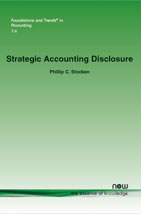Strategic Accounting Disclosure
Phillip C. Stocken, Tuck School of Business at Dartmouth College, USA, Phillip.C.Stocken@Dartmouth.eduAbstract
This monograph surveys the analytic accounting disclosure literature in which firms strategically communicate information to investors. Its purpose is to identify guidelines that firm management might consider when voluntarily disclosing or mandatorily reporting information to investors and also factors that investors might recognize when using a firm's disclosure. It discusses persuasion games, costless signaling games, and costly signaling games. The monograph highlights the primary features of the equilibria in these games and how communication varies in each of these settings. It then surveys work that uses these frameworks. This work suggests that a firm's disclosure policy depends on the features of its environment. The monograph concludes that characterizing firm disclosure policies for a set of generic features of the reporting environment awaits further research.
Strategic Accounting Disclosure
Strategic Accounting Disclosure focuses on accounting disclosure within a non-contractual setting in which Revelation Principle does not apply. It examines a setting featuring a Sender — a firm manager or a sell-side equity analyst — who has some information about a firm to communicate to a receiver — an investor — to help value the firm. It considers models that assume there are constraints on the sender's communication, or if there are no constraints on the sender, the receiver cannot commit to use the sender's report in a particular way. With this assumption in place, this monograph surveys the strategic mandatory and voluntary disclosure literature and partitions it into three types of disclosure regimes:
1. On one end of the continuum, the author outlines the primary frameworks in persuasion games. In these games, the sender's report is restricted to be truthful although the sender may withhold information.
2. On the other end of the continuum, the author describes costless signaling games. In these games, the sender is free to issue vague or even misleading reports. It illustrates the "cheap talk" model and discusses research that has extended this framework to better understand communication within the financial reporting environment.
3. Between the two ends of the continuum, the author discusses costly signaling games. In these games, the sender can misreport the signal but only at some cost.
Strategic Accounting Disclosure distills the key ingredients in these frameworks and uses common notation to emphasize their relation and innovation. The author surveys subsequent work that uses each primary framework to deepen our understanding of firm communication. The monograph emphasizes that the specific characteristics of the institutional environment affect the equilibrium properties of a firm's disclosure policy and an investor's information set. The motivation for simply representing these frameworks and then outlining the related literature that applies them is to make the accounting disclosure literature more accessible to doctoral students to whom this monograph is targeted.
